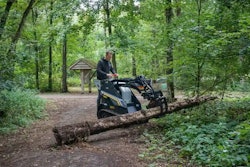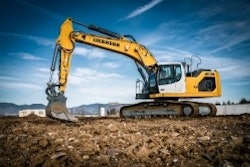When Ed Compeau graduated from college in 1981 with a business degree, he knew he had a long road ahead of him. Jobs in Michigan were scarce at the time, but Ed was eventually hired by a paving company. The company hired Ed’s younger brother Charlie later that same year.
By 1988, though, the entrepreneurial bug had bit, and Ed convinced Charlie to start a company with him. Using a leased backhoe, the two landed a by-the-hour pipe installation job in Lansing, some two hours away. Charlie operated the backhoe while Ed stayed back in Trenton, Michigan, making contacts and bidding jobs.
“Charlie made the money and I spent it,” says Ed with a laugh. “We got started in our Mom’s backyard, and kept going from there.”
The company’s growth has meant several changes of address over the years. From the backyard they moved to a small garage in Trenton, then built a pole barn around the corner from that place. They then moved to their present facility in Flat Rock about eight years ago, and they’re getting ready to move again, to a six-and-a-half-acre site up the road from where they are now.
“We’ve just outgrown this place,” Ed says. “The yard is packed, plus we want a more modern facility.”
The planned move – which the brothers swear will be their last – will also accommodate the anticipated growth of their topsoil business. “We have a mountain of topsoil out here,” says Charlie. “We need to have a place to store it.”
A sympathetic banker
When Ed recalls the conditions when he and Charlie started out, he envies the options available to contractors today, including rental and low-cost financing. “We had no money,” he says. “My wife’s job was covering a lot of bills, plus she was doing our office work. We were using our Visa, Mastercard and American Express cards. Wherever we could maneuver a dollar, we were doing it.”
The two clearly needed a financial leg up. But when they approached banks, “they’d laugh at us,” Ed says. The situation turned around, though, when they met a sympathetic banker six years after starting their business. They got a loan to pay off their equipment and establish some working capital.
“When that happened,” Ed says, “everything went to a whole new level.”
A 50/50 mix
The brothers say they’re doing about the same work as when they started, just doing more of it. Compeau Brothers began by doing asphalt removal and grading for paving companies in the area. They quickly started performing site development work, including earthwork, underground utilities and paving prep.
Along the way, they’ve also picked up municipal pipe jobs, including water mains and sanitary sewers. Their present mix of jobs is about 50/50 between private and public work. “We like working back and forth between the municipal and site development jobs so everything gets into a good rhythm,” Ed says. “We usually have around six jobs going on in various stages at any given time.”
One of their better clients has been McDonald’s, which has done several from-underground-utilities-up replacements of aging stores in the area. “They tear them down and completely rebuild them,” Charlie says. On these jobs, Compeau Brothers does all the site work and anything that does not involve the actual
structure.
Another challenging job has been a wetlands mitigation project for the Meijers grocery chain. Under Michigan Department of Environmental Quality rules, when companies want to develop land in a designated wetlands area, they have to create double the land acreage in wetlands elsewhere. “We’re creating ponds and streams, and moving around 40,000 cubic yards of dirt,” Ed says. This type of work has an added benefit: it’s an interesting diversion from the typical work for their crews.
A Compeau sewer rehabilitation job in downtown Trenton, Michigan.
People are key
“Our people are what makes this all work,” Ed says of the firm’s 40 or so employees.
In fact, Ed Riley, who taught Charlie how to operate equipment while he was with the paving company, now works for the brothers, running their grading crew. “A lot of our key people have been with us from the start, including Donna Coppola, our office manager.”
Of course, winters are slower in Michigan but there have been some recent winters in which the company has been able to work all the way through the season. The company typically works within a 100-mile radius.
Conscious buying decisions
The company now owns about 100 pieces of equipment, both large and small, and a mixture of brands. “People fight for their business,” says Steve Whirley with Michigan Cat. “They make conscious buying decisions and they don’t do impulse buying. They make wise use of their resources and do things the right way.”
“Our philosophy is to try to update most machines every three or four years,” Ed says.
Updating can mean either replacing or overhauling. “We’ll totally overhaul it, especially if it’s a machine we own, and they look like new when we get done.” he says. “But we try to keep late model units for most of our machines. It keeps the downtime to a minimum.”
The brothers pay special attention to their trucks. “We can’t mess with them,” Ed says. “You’ve got to have good, solid, late model trucks because if the equipment can’t get to the jobsite, you can’t make any money.”
Two mechanics work fulltime year around at Compeau Brothers. “In the summer,” Ed says, “they chase equipment, and in the winter we bring it to them. Our mechanics do a good job of keeping us running.” Each winter day, one of them comes in early to fire up the trucks. “That way, ” he says, “they’re ready to go and they’re not pouring ether into them.”
Typical rental items include concrete breakers and articulated haul trucks. “Everything else we try to own,” Ed says, “unless we’ve got so many jobs going, then we’ll rent to fill the voids.”
The two are strong believers in owning their fleet. “That way,” Ed says, “you control your own destiny. With our mix of owned, leased and rented machines, it all works pretty well. I just don’t think you can rent everything and make any money.”
Charlie agrees: “When the equipment’s paid off, if you maintain it properly, that’s when you’ll make money.”







